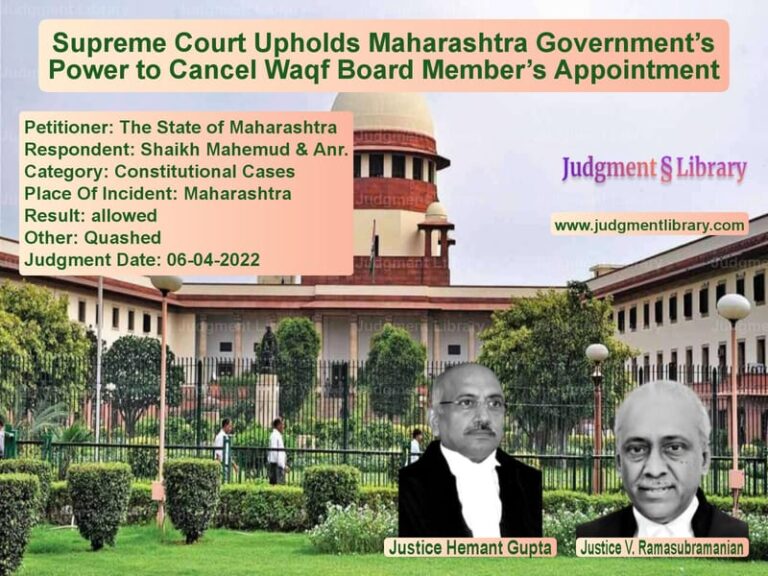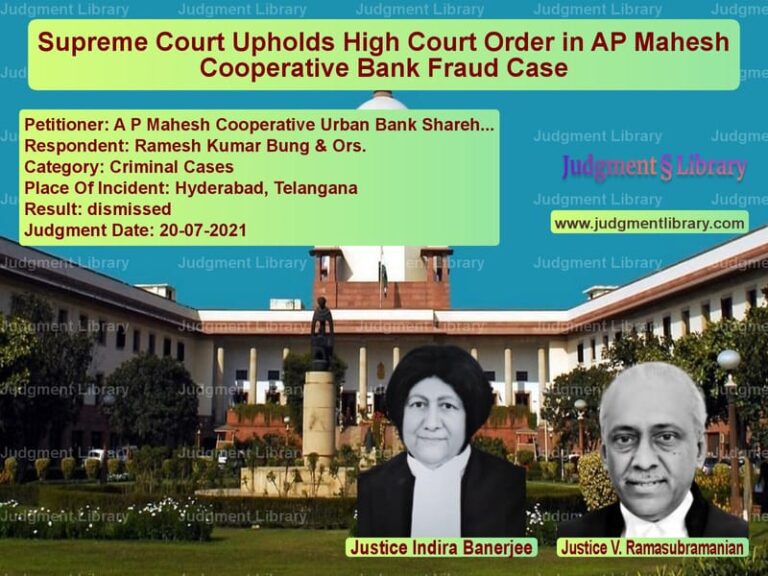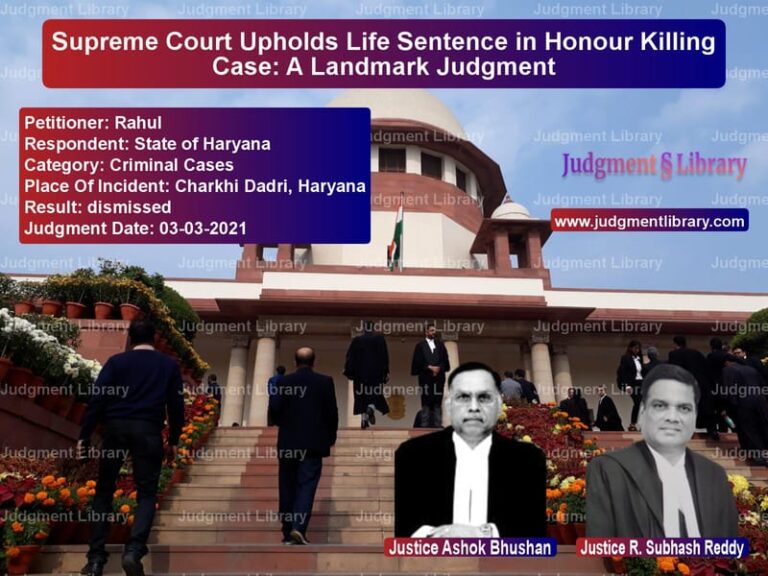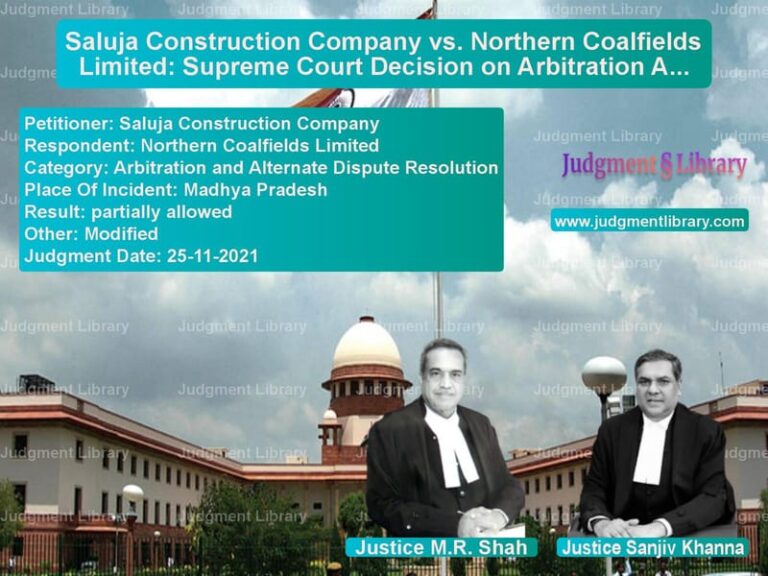Supreme Court Upholds Land Acquisition by Bangalore Development Authority
The Supreme Court of India, in the case of H. N. Jagannath & Others vs. State of Karnataka & Others, ruled in favor of the Bangalore Development Authority (BDA), reaffirming the legality of its land acquisition for the Mahalakshmi Layout (also known as Nandini Layout). The Court set aside the Karnataka High Court’s Division Bench ruling, which had allowed the respondent to challenge the acquisition process and seek legal remedies through civil litigation.
Background of the Case
The dispute dates back to 1977 when the Bangalore Development Authority (BDA) issued a notification under Section 17(1) of the BDA Act, proposing to acquire land in the villages of Leggere and Jaraka Bande Kaval for residential development. The acquisition included:
- A total of 519 acres and 37 guntas in Jaraka Bande Kaval village.
- Out of this, 393 acres and 25 guntas were acquired for forming the Mahalakshmi Layout.
- The land belonging to Respondent No. 4 (measuring 25 acres and 20 guntas) was included in the preliminary notification.
The final declaration under Section 19(1) of the BDA Act was issued on August 30, 1979 and gazetted on September 20, 1979. The land acquisition award was passed on June 4, 1985, and possession was taken on September 23, 1986. A notification under Section 16(2) of the Land Acquisition Act confirming the acquisition was published on November 20, 1987.
Legal Journey of the Case
Despite the finalization of the land acquisition process, Respondent No. 4 initiated multiple legal proceedings:
- 1985: Filed an injunction suit (O.S. No. 10488 of 1985) against BDA, obtaining an ex-parte order.
- 1986: The trial court modified the injunction, allowing BDA to form roads on the acquired land.
- 1989: Respondent No. 4 filed another suit (O.S. No. 3551 of 1989) seeking to protect possession but failed to obtain full relief.
- 1991: Filed a writ petition (WP No. 17040 of 1991) in the Karnataka High Court challenging the acquisition, which was dismissed due to delay.
- 1993: The Karnataka Government rejected a request for de-notification.
- 1996: Another suit for injunction (O.S. No. 16147 of 1999) was dismissed.
- 2004: Filed a fresh writ petition (WP No. 49339 of 2004) seeking to nullify the acquisition, which was dismissed by the Single Judge.
- 2007: Filed a writ appeal (WA No. 1575 of 2007) before the Division Bench of the Karnataka High Court.
Petitioners’ (BDA and Allottees) Arguments
The appellants, who were allottees of sites in the layout, contended that:
- The land acquisition was completed in compliance with the BDA Act, and possession was taken lawfully.
- Respondent No. 4 had repeatedly litigated the same issue over the decades, engaging in an abuse of the legal process.
- Hundreds of allottees had constructed houses on the plots, and revisiting the acquisition would create legal uncertainty.
- Once possession was taken and development was carried out, the validity of the acquisition could not be reopened.
Respondent’s (Landowner) Arguments
The respondent argued that:
- Despite the acquisition, the land remained in their possession and was used for running a school and orphanage.
- The acquisition should be set aside as the land was not utilized for public purposes.
- The Division Bench of the High Court correctly allowed them to seek civil remedies.
Supreme Court’s Observations
The Supreme Court, in a judgment delivered by Justice Arun Mishra and Justice Mohan M. Shantanagoudar, made several critical observations:
“The respondents have approached the courts repeatedly, despite prior dismissals, in an attempt to unsettle a settled issue. This constitutes an abuse of process of law.”
Other key findings included:
- The BDA had lawfully acquired the land, compensated the landowner, and completed the layout formation.
- Respondent No. 4 had withdrawn earlier suits without seeking liberty to refile, thereby barring fresh litigation.
- The High Court’s Division Bench erred in allowing the respondent to pursue further civil litigation despite multiple judicial rulings upholding the acquisition.
Final Judgment
The Supreme Court ruled as follows:
- Set aside the Karnataka High Court’s Division Bench ruling.
- Restored the judgment of the Single Judge dismissing the writ petition.
- Confirmed the legality of the land acquisition process.
- Held that no further civil suits challenging the acquisition were maintainable.
Impact of the Judgment
The ruling has significant implications for land acquisition and urban development:
- Reaffirms finality of land acquisitions: Prevents reopening of legally completed acquisition processes.
- Prevents abuse of litigation: Deters landowners from repeatedly challenging acquisitions after failing in previous legal proceedings.
- Protects public infrastructure projects: Ensures that government-planned layouts remain undisturbed by prolonged legal disputes.
- Clarifies limits of judicial review: Confirms that courts should not interfere in settled acquisition cases unless procedural irregularities exist.
The Supreme Court’s decision in this case ensures that urban development projects, once lawfully executed, are not derailed by endless litigation, safeguarding the interests of both public authorities and homebuyers.
Don’t miss out on the full details! Download the complete judgment in PDF format below and gain valuable insights instantly!
Download Judgment: H. N. Jagannath & Ot vs State of Karnataka & Supreme Court of India Judgment Dated 06-12-2017.pdf
Direct Downlaod Judgment: Direct downlaod this Judgment
See all petitions in Property Disputes
See all petitions in Landlord-Tenant Disputes
See all petitions in Contract Disputes
See all petitions in Judgment by Arun Mishra
See all petitions in Judgment by Mohan M. Shantanagoudar
See all petitions in allowed
See all petitions in Quashed
See all petitions in supreme court of India judgments December 2017
See all petitions in 2017 judgments
See all posts in Civil Cases Category
See all allowed petitions in Civil Cases Category
See all Dismissed petitions in Civil Cases Category
See all partially allowed petitions in Civil Cases Category







